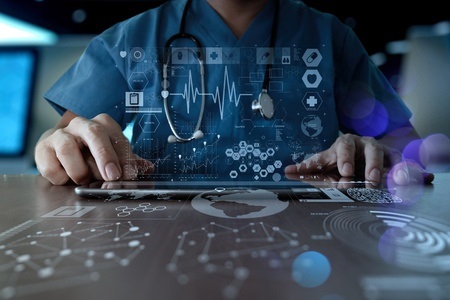In recent years, advances in technology have transformed virtually every aspect of modern life, and healthcare is no exception. The healthcare industry has embraced technology in many different forms, from electronic health records (EHRs) to telemedicine to wearable devices that monitor vital signs. The goal of these innovations is to improve patient outcomes by making healthcare more efficient, effective, and accessible.
Benefits of Technology in Healthcare

Improved Quality of Care
One of the most significant benefits of technology in healthcare is improved quality of care. With access to digital health records, doctors and other healthcare providers can quickly and easily access important patient information, including medical histories, diagnostic test results, and medication lists.
This information helps providers make more informed decisions about treatment and care, which can lead to better health outcomes.
Increased Access to Care
Another key benefit of technology in healthcare is increased access to care. With telemedicine, patients can connect with healthcare providers remotely, eliminating the need for travel and reducing the wait time for appointments. In rural and underserved communities, telemedicine has been especially helpful in improving access to care for patients who would otherwise have difficulty getting to a doctor’s office.
Better Patient Engagement
Technology can also help improve patient engagement, by making it easier for patients to access their health information and communicate with their healthcare providers.
For example, many health systems now offer patient portals that allow patients to view their health records, request prescription refills, and communicate with their providers. This can help patients take a more active role in their care, which can lead to better health outcomes.
More Efficient Care Delivery
Technology can also help make healthcare more efficient, by automating many routine tasks and reducing the time that healthcare providers spend on paperwork. For example, EHRs can help streamline the process of documenting patient information, reducing the time spent on this task and allowing providers to spend more time with their patients.
Challenges to Overcome

Privacy and Security Concerns
One of the biggest challenges to implementing technology in healthcare is privacy and security. Health information is highly sensitive and must be protected to ensure that patient’s rights are respected and that their health information is not misused. To ensure the privacy and security of health information, it is important to implement strong security measures and train healthcare providers on how to properly use and manage health information.
Cost of Technology Implementation
Another challenge to implementing technology in healthcare is cost. Healthcare organizations must make significant investments in technology to reap the benefits of digital health.
This can be a challenge for smaller organizations and those serving low-income populations. In addition, there is often a learning curve associated with new technology, and healthcare providers must be trained on how to use these tools effectively.
Resistance to Change
Finally, there may be resistance to change from some healthcare providers and patients. For example, some providers may be resistant to adopting new technologies, while some patients may be concerned about the privacy and security of their health information.
To overcome these challenges, it is important to educate all stakeholders on the benefits of technology in healthcare and to provide support as they transition to new tools and processes.
Some of the areas in healthcare where technology is likely to have the most impact include:
Remote Patient Monitoring
Remote patient monitoring (RPM) involves the use of wearable devices and other technology to track patients’ health data and send it to healthcare providers in real time. This allows providers to monitor patients’ health and make adjustments to their treatment plans as needed, reducing the need for in-person visits and improving outcomes.
Predictive Analytics
Predictive analytics uses machine learning algorithms to analyze vast amounts of data, including electronic health records, to identify patterns and make predictions about future health outcomes. This can help healthcare providers make more informed decisions about patient care and can lead to improved outcomes.

Personalized Medicine
Personalized medicine is an approach to healthcare that takes into account a patient’s unique genetic, lifestyle, and environmental factors to create individualized treatment plans. Technology, including genetic sequencing, is playing a crucial role in advancing this field and improving patient outcomes.
Virtual Care
Virtual care, or telemedicine, allows patients to connect with healthcare providers remotely, improving access to care and reducing the need for in-person visits. This technology is especially beneficial for patients in rural areas or for those with mobility issues.
Artificial Intelligence
Artificial intelligence (AI) is being used in healthcare to help diagnose and treat diseases, analyze medical images, and automate routine tasks, freeing healthcare providers to focus on patient care. AI has the potential to greatly improve healthcare outcomes, but it must be used responsibly and ethically.
Conclusion
In conclusion, technology has the potential to greatly improve patient outcomes by making healthcare more efficient, effective, and accessible. Despite the challenges that must be overcome, the benefits of technology in healthcare are clear and will continue to drive the adoption of new technologies in the years to come.
By embracing technology and working to overcome the challenges that it presents, healthcare providers can help ensure that their patients receive the best possible care and have better health outcomes.























